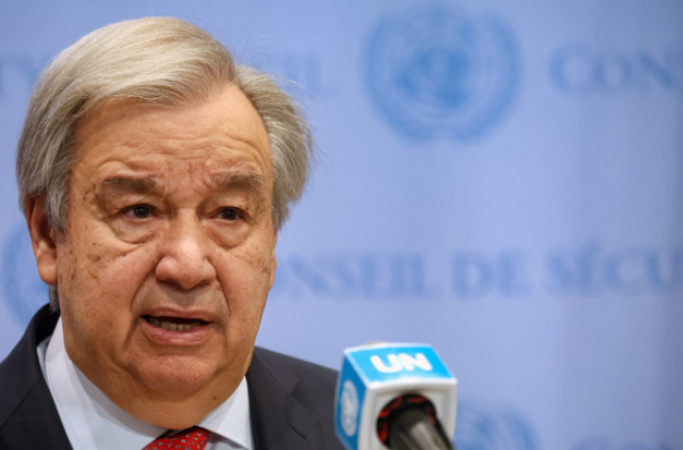
UNO: The post-Cold War era is over, Secretary-General Antonio Guterres declared to the world's nations on Thursday, and a new multipolar era is already characterized by the highest level of geopolitical tensions and major power competition in decades.
He emphasized that the United Nations' core principle of having all nations cooperate to address global challenges is being threatened by these divisions.
The UN chief listed a number of difficulties: more deadly and complicated conflicts; resurgent fears of nuclear war; wide-spread inequality within and between nations; the climate emergency; growing mistrust of public institutions; and attacks on human rights all over the world, "including a pernicious pushback against women's rights."
The secretary-general claimed that it has become even more challenging to address these issues as a result of Russia's invasion of Ukraine in February 2022. And he expressly criticized Russia without naming it, saying that "the right to peace would be guaranteed" if all nations upheld their commitments under the UN Charter, which include respecting the sovereignty and territorial integrity of all states.
Also Read: EU Considers Moving Military Training Centers to Ukraine
Guterres gave diplomats from the 193 member states of the UN a policy paper outlining his "New Agenda for Peace" in which he laid out his pessimistic view of the world. According to him, it is an effort by the UN to address the new threats.
The head of the UN emphasized how crucial it is to maintain multilateralism, saying: "In our fractured, troubled world, it is incumbent upon states to preserve our universal institution, in which they have a stake."
"The time to act is not when the divisions and fractures have engulfed us," he declared. "Now is the time to act."
Following the dissolution of the Soviet Union and the end of its Cold War with the United States, then-UN Secretary-General Boutros Boutros-Ghali introduced the original Agenda for Peace in 1992. The UN could strengthen its work on preventive diplomacy, peacekeeping, and peacebuilding, as it welcomed the end of "hostility and distrust" between the superpowers.
Also Read: Former Venezuelan Spy Chief Headed to US to Face Drug Charges
The International Crisis Group's UN director, Richard Gowan, stated that the organization has been operating under the tenet "of an activist, interventionist UN" for the past three decades. However, he noted that Guterres' "New Agenda for Peace" emphasizes that diplomacy must serve as "the driving force for a new multilateralism."
Gowan said in an analysis of the new agenda that it places a strong emphasis on what member countries must do and multilateral cooperation in an increasingly divided and unequal world, "in which Guterres believes that the UN must adapt to facilitating international cooperation, not aiming to lead it."
This proposed new strategy is most clearly seen in the secretary-general's opinions on the UN's extensive peacekeeping missions, particularly in light of the Security Council's decision on June 30 to immediately terminate the mission's more than 15,000-strong presence in Mali in response to demands made by the country's military junta, which has hired mercenaries from Russia's Wagner Group to aid in the fight against an Islamist insurgency.
While peacekeepers have saved millions of lives, according to Guterres, "longstanding unresolved conflicts, driven by complex domestic, geopolitical, and transnational factors, as well as a persistent mismatch between mandates and resources, have exposed its limitations." He stated unequivocally that "peacekeeping operations cannot succeed when there is no peace to keep."
His suggested peace agenda exhorts countries to adopt "nimble, adaptable" peacekeeping models with exit strategies and to support "peace enforcement action by regional and sub-regional organizations," as directed by the Security Council, financed by UN member states, and supported by political efforts to advance peace.
No continent is more in need of this new wave of peace enforcement missions than Africa, according to Guterres.
Also Read: 'Eternal gratitude' is extended to the Russians by the head of British intelligence
The UN hopes that the Summit of the Future, which will be held in September 2024, will result in the adoption of a new vision for the years ahead that reflects the state of the world today while preserving multilateralism. The "New Agenda for Peace" is one of several policy papers the secretary-general is urging all nations to consider before the Summit of the Future.
Following Guterres' speech, many nations expressed their initial opinions on the suggested agenda, which received largely enthusiastic support from the European Union and other groups. Egypt, however, criticized some of the proposals as being overly ambitious, and Russia cautioned against interfering in domestic affairs while criticizing the agenda's strong focus on human rights and calling its treatment of climate change controversial.